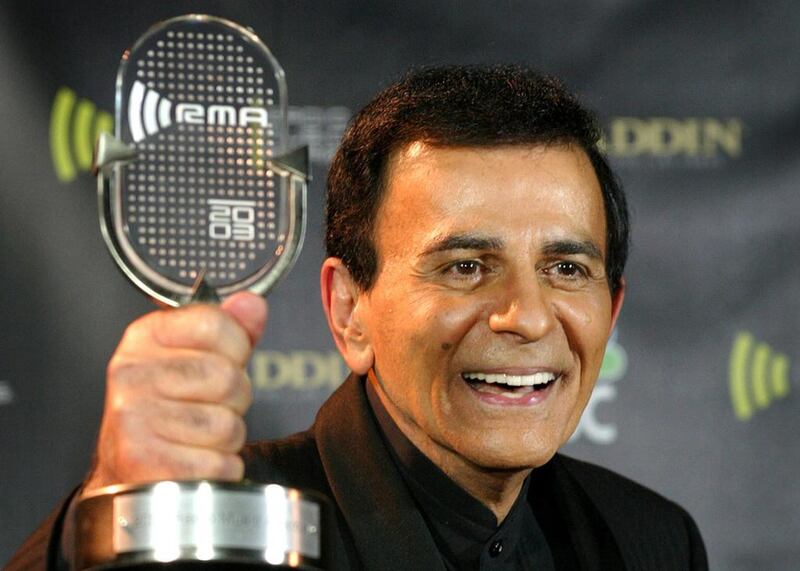Early Sunday morning my daughter, Michele, called me with the sad news that my dear friend, Casey Kasem, had passed away. My heart wept.
Fond memories of our times together flashed through my mind. Then I recalled the last few years of his life, when Casey struggled valiantly with serious health problems.
I last saw him in 2011, when his daughter, Julie, had invited us to her home for lunch. Though he was thin, fragile and had difficulty speaking, Casey’s mind was as keen as ever.
At the time, I wondered whether millions of Casey’s fans would ever know about his quest to eradicate harmful stereotypes of Arabs. Though he should be remembered as a great radio personality, as the voice of Scooby-Doo’s Shaggy, and as a champion of good causes, Casey should first and foremost be remembered as a civil rights activist, determined to illuminate justice.
We first met 30 years ago, at an Arab American gathering in Washington, DC. My book, The TV Arab, had just been released and when I gave him a signed copy he quickly responded with a smile and a huge hug.
From that moment on we became friends, true friends.
And from that moment on Casey began to spend much of his time speaking out. He participated in and supported workshops for peace. He began calling the TV industry’s attention to Arab stereotypes and received positive responses.
Each and every time I published a book on the stereotype, Casey was at my side. He would purchase dozens of copies, determined to spread the word he would pass them out to colleagues and media personnel.
We worked together on his ground-breaking essay titled I Want My Son to be Proud.
In this article Casey helped counter the stereotype by citing the names of numerous notable Arab Americans.
He wanted his 12 year-old son, Mike, and other young people to be proud of their roots. He made visible to American readers, for the very first time, the many contributions Arab Americans made to their country.
Today, an expanded version of the original essay which highlights positive contributions made by Arab-Americans, Arab Americans Making a Difference, remains one of the most effective and sought after publications offered by Washington’s Arab American Institute.
The professional and the professor – we were a team.
We believed the future belonged to young optimists, that they would make a difference.
At the same time, our activism called for a united team effort.
We were guided by the Arab proverb, “One hand does not clap.”
Several times, we spoke on radio and appeared on TV together to contest and eradicate harmful images.
Alone, at Walt Disney headquarters in Burbank, the two of us squirmed in our seats as we viewed a special screening of the controversial 1932 cartoon, Mickey in Arabia.
A year later, Casey was with me and others helping to convince Disney to delete the harmful opening lyrics of Aladdin, which they did. Disney executives dared not challenge the wisdom of Casey Kasem.
We also worked well together as script consultants, editing the teleplay for Hanna-Barbera’s TV movie Scooby Doo in Arabian Nights.
Yet, the quiet times we shared as friends remain the most memorable. I recall one evening, especially, at his home; he had this great popcorn machine and popped enough corn for an army; we ate every kernel while watching the Lakers play; Casey loved the Lakers.
We would hear Michele sing at Chadney’s, a jazz club near NBC’s Burbank studios; and we would often meet and dine at the Lebanese restaurant, Carnival, with our friend Don Bustany.
We would go on and on about how best to counter the stereotype, then brag about our roots.
When together in the public arena Casey would always express humility and kindness to one and all.
He was a humanitarian, a man of peace who was a champion for justice in the Middle East.
Kamel Amen Kasem should be remembered as one of God’s most gentle beings; as a man who sincerely cared about others, who always kept his feet firmly planted on the ground.
This is why his tender soul now rests in its rightful place, among the brightest stars in our universe.
Jack G. Shaheen is the author of Reel Bad Arabs: How Hollywood Vilifies a People and Guilty: Hollywood’s Verdict on Arabs After 9/11





